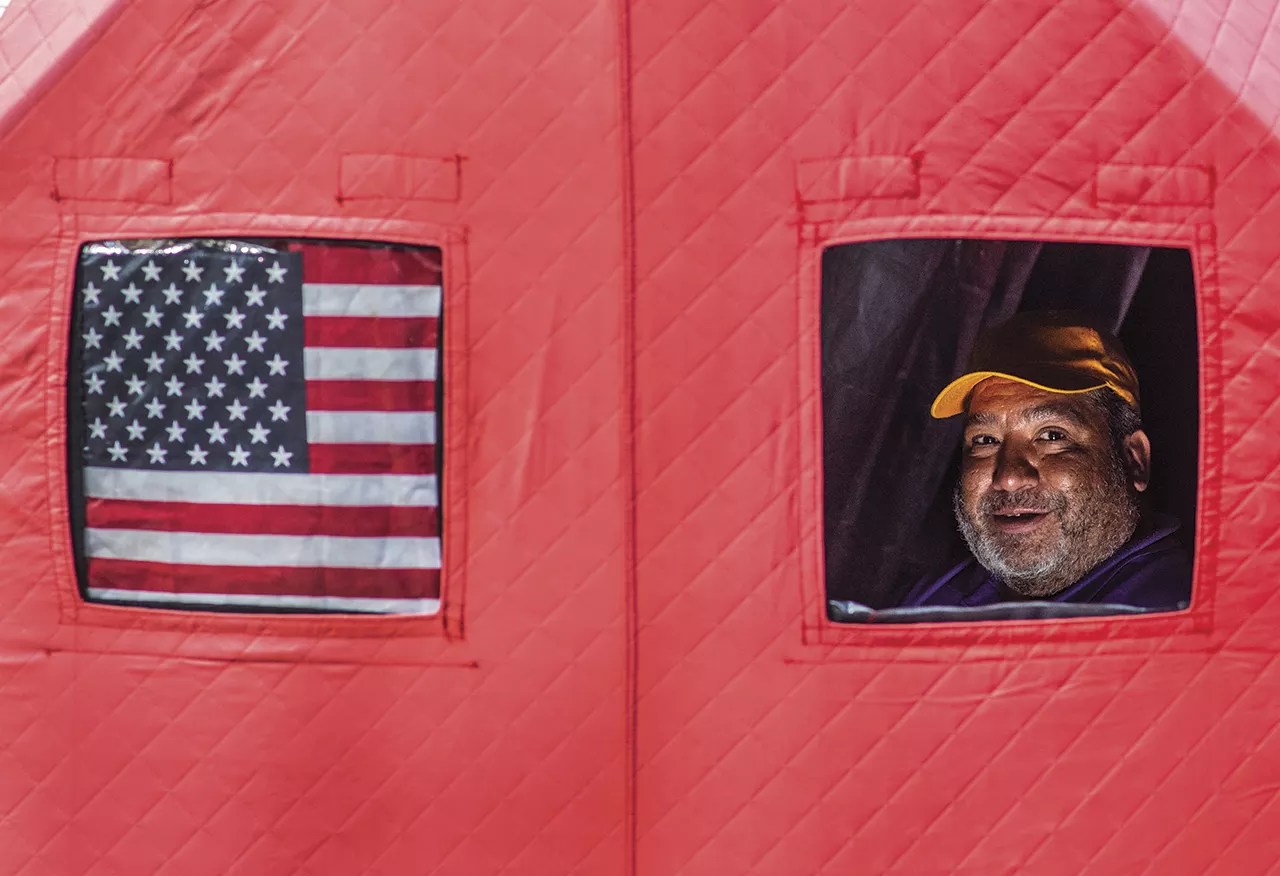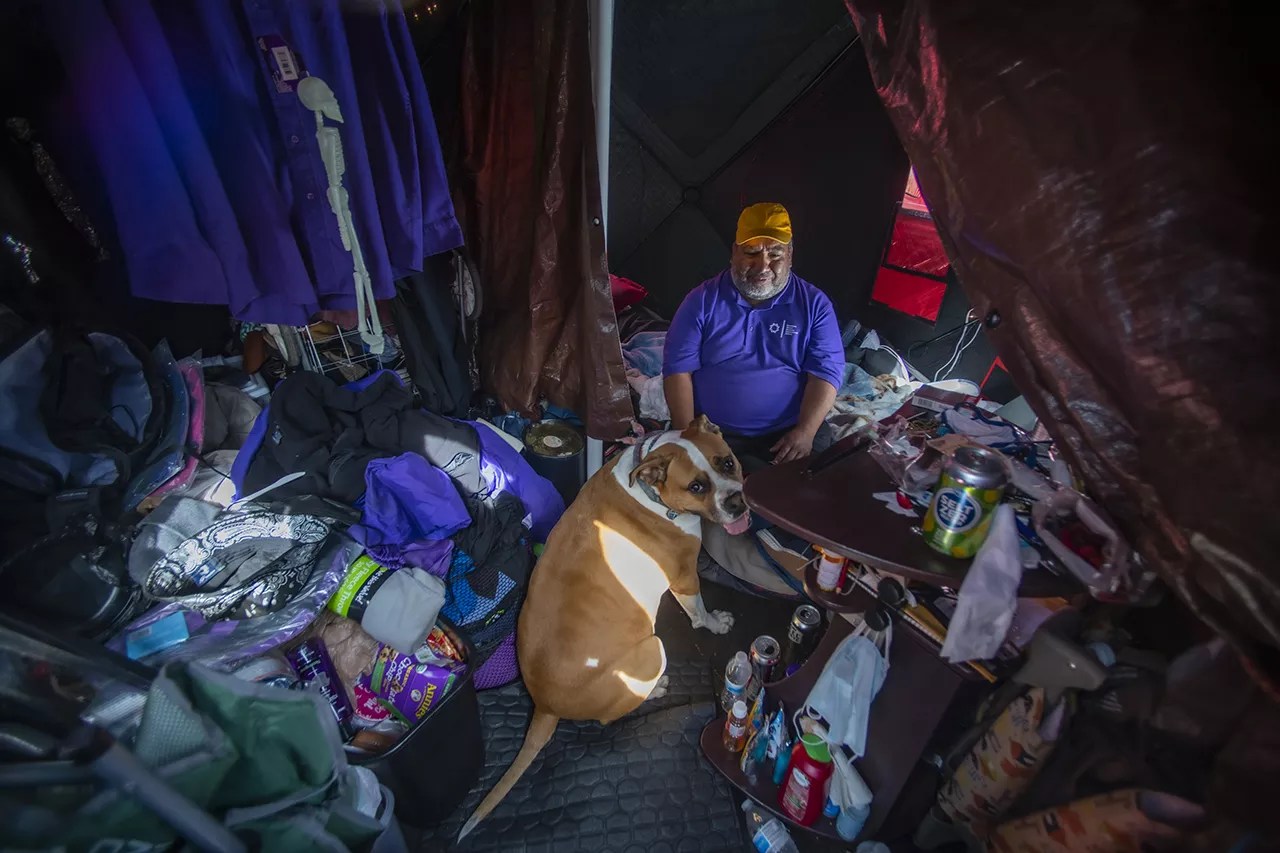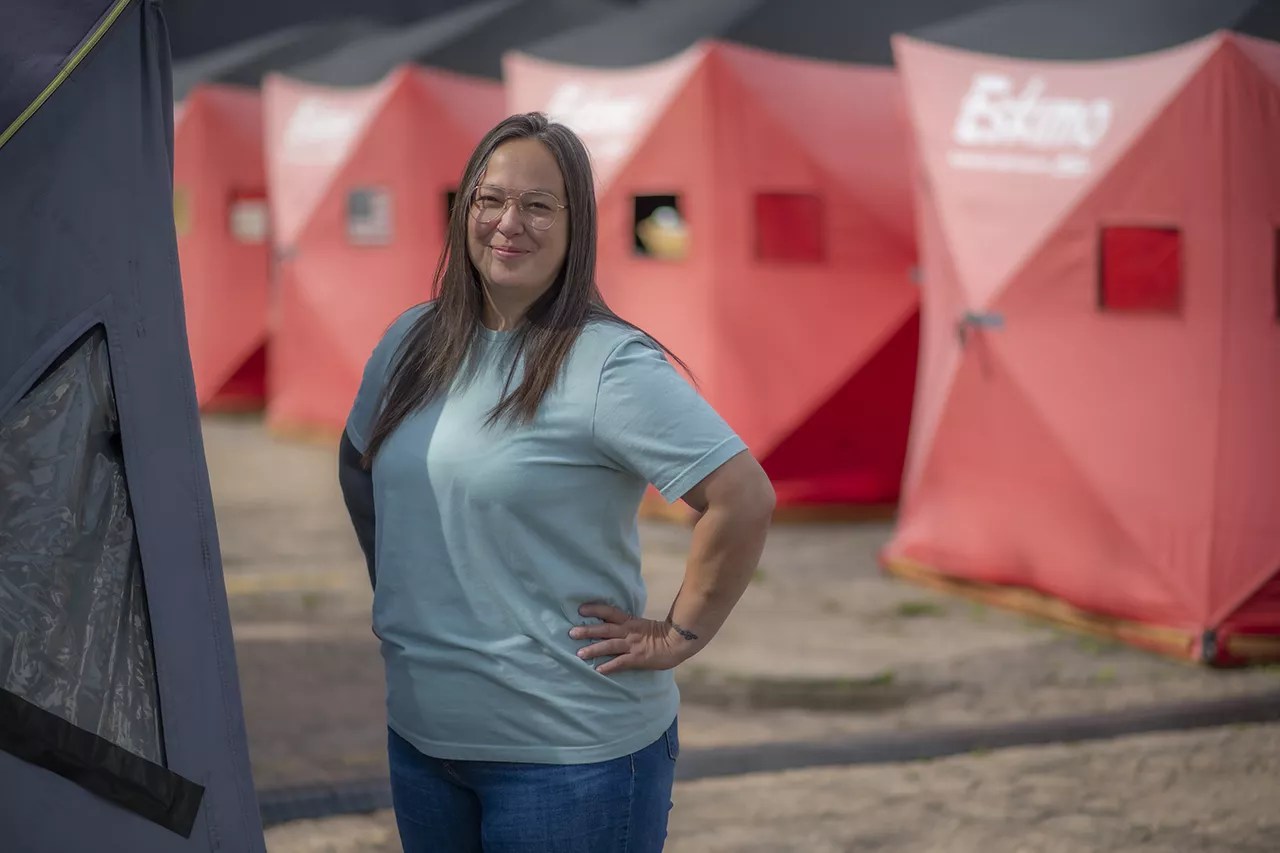
Evan Sem

Audio By Carbonatix
Mark Montes is feeling good about himself right now. Known as Shorty among his friends, the fifty-year-old has been working a steady part-time job for over a month, cleaning the 16th Street Mall for the Downtown Denver Business Improvement District.
“I like working there,” Montes says. “It’s really cool. You see people, like all of the people that work in those buildings, man. There’s a lot of people that are very, very important. You see them walking around, you see them having lunch. I watch which restaurants get busy. You can see where they all gather. It’s pretty cool.” And it could soon get cooler, with several major events coming to Denver this summer, including Major League Baseball’s All-Star Game.
Montes lives just a handful of blocks from the mall, in an ice-fishing tent in the parking lot of the Denver Community Church at East 16th Avenue and Pearl Street. He and approximately thirty other individuals currently call that lot home; it’s one of the two safe-camping sites that debuted in Denver last December.
The sites, which are equipped with toilets and sinks and offer 24/7 staffing and services, are a new experiment for the city. Since he signed the urban camping ban in 2012, Mayor Michael Hancock has focused on getting homeless individuals into shelters, often using sweeps to discourage camping on the streets. But after initially balking at the safe-camping site concept, Hancock approved the establishment of the sites by nonprofit service providers last summer. The immediate benefits of such setups are clear: Residents are able to live in a stable environment and not worry about getting displaced by authorities – especially during a pandemic.
And so far, Montes is living proof of their success.
Born and raised in Denver, Montes graduated from North High School and married his high school sweetheart not long after. He worked at a local animal rendering factory, even joining a union; he later was a cook at the Pepsi Center. He and his wife had two children, a boy and a girl, then split up after fourteen years of marriage. Montes soon remarried, and his second wife gave birth to a daughter, who died of cancer. Montes got divorced again and had a few other partners before settling down with his third wife.
The really bad times started in 2001, when his wife drank herself to death, he says.
By then, Montes was working for a temp agency, often doing construction or landscaping, or taking gigs at warehouses. When the landlord jacked up the rent on his place in Aurora, he couldn’t afford the extra cost. He eventually found himself living on friends’ couches or in their backyards, then finally moving to the streets.
He tried shelters, but he got kicked out of one for using his own cleaning method to ensure that he wouldn’t have to deal with bedbugs, Montes remembers.
After that, he camped wherever he could, including parks, where the rangers generally didn’t give him a hard time. “As long as you weren’t with a lot of people, if it was just you and one other person, they wouldn’t really say anything,” he says. “If it got to when everyone was bringing all [their] stuff and all of that, that’s when they would kick us out.”
Until January, Montes had been living on the streets for more than a decade, sleeping underneath a tarp or in a tent that he would set up somewhere in the city. During those years, his life revolved around getting a buzz and simply surviving. To make money, he’d occasionally shovel snow or fly a sign. “When I was on the streets, all I was doing was just drinking, not worrying about my health,” he recalls.
Even though his two living children are adults and he has siblings himself, Montes didn’t want to ask for help from his family. “I don’t like to ask my kids for help,” he explains. “The only way I’m going to learn is to let me do it.”
But finally, he did accept help from some Denver do-gooders.

Mark Montes inside his tent at Denver Community Church.
Evan Sem
Cole Chandler was one of the service providers who pitched the safe-camping site concept to Hancock. He’s with the Colorado Village Collaborative, which has set up tiny-home villages in the city, and thought safe-camping sites could provide an option to shelters for people who were still living on the streets as the pandemic grew. But the mayor expressed reluctance.
“At this time, we don’t see a reason for us to create outdoor sanctioned camp sites,” Hancock said at a press conference in late April 2020. “We’re not going to move in that direction, but we are going to continue to work hard to create opportunities indoors for our residents.”
The Centers for Disease Control and Prevention has advised municipalities not to disperse encampments unless individual housing units are available, so as to not further the spread of COVID-19. But while the city had largely stopped sweeps in the first months of the pandemic, it started them up again last summer.
That’s when, following months of lobbying by service providers and a majority of Denver City Council members, Hancock finally warmed to the idea of allowing safe-camping sites in Denver.
Even so, the first attempts to establish such sites fell flat. Initially, the city planned to lease parking lot space outside the Denver Coliseum – which had been used as a temporary homeless shelter – for a safe-camping site that would be run by a nonprofit. But residents of the nearby Globeville and Elyria-Swansea neighborhoods loudly protested the proposal, saying that the city has consistently placed projects in their part of town that wealthier neighborhoods would successfully keep from being placed in their own backyards. And when Councilwoman Candi CdeBaca, whose district includes the area, and Councilwoman-at-Large Debbie Ortega came out against the location, that made it clear that a lease proposal for the site would not pass a vote of council.
Next, Denver officials and service providers identified a small, city-owned plaza between Sonny Lawson Park and the Blair-Caldwell African American Research Library in Five Points as a potential safe-camping site location. But again, objections from neighbors – especially members of the Five Points Business Improvement District, who accused the city of trying to ram through another undesirable project in an area with a significant minority population – put a stop to that suggestion. After that, Hancock said the city would be sure to discuss any possible sites with the affected communities.
In the meantime, service providers – particularly the Colorado Village Collaborative and the Interfaith Alliance of Colorado – came up with a new plan. They realized that while leasing city-owned property would require council approval, leasing private property for a safe-camping site would require no such step. Instead, all that would be needed would be a temporary zoning permit issued by the Denver zoning administrator. So in December, the CVC and the IAC, in partnership with the nonprofit Earthlinks, leased parking lots from two churches in central Denver for safe-camping sites. While some residents protested the establishment of the sites in their neighborhoods, citing concerns about safety, trash and noise, those complaints largely disappeared once the sites were up and running.
Today the sites – one operated by the CVC at Denver Community Church, the other by Earthlinks and the IAC at First Baptist Church just south of the Capitol – each host a few dozen people. They’re not a fit for everyone living on the streets, as there are basic rules for residents. But each site has had a waitlist from the start.

Cuica Montoya oversees the safe-camping site where Mark Montes is a resident.
Evan Sem
In November, outreach workers who knew Montes told him about the safe-camping sites that would soon be set up in the Uptown and Capitol Hill neighborhoods. There would be sturdy tents, bathrooms and sinks, they said, and there would be better connection to services. If Montes lived at one of the sites, he wouldn’t have to worry about a police officer or a park ranger telling him that he had to move.
“He had grown weary of the unsettledness of camping outside,” says Kelda Polomik-Tene, an outreach worker with the St. Francis Center who has known Montes for years.
After adding his name to a waiting list, Montes got a spot at the Denver Community Church site in January. While most of the residents who moved in at the start have stayed at the site, a few moved on.
Cuica Montoya, the CVC staffer who manages the site, says that one Marine vet didn’t find it a good fit. “It was not the most successful space for him,” she explains, adding that his departure was a mutual decision. “What’s unique about this environment is that we do need you to be part of the community.”
Montes wasn’t totally sold on the safe-camping site concept when he moved in, either. Recalls Montoya: “He was like, ‘I’m going to give it a try.’ He wasn’t all for it and wasn’t against it.”
But Montes is now definitely sold.
During the almost five months he’s been living there, Montes has taken much better care of his health, and is now seeing multiple doctors on a frequent basis. He also isn’t bogged down by the drinking problems that had plagued him in the past, even if that’s meant distancing himself from some of his old buddies with whom he used to crack open beers. “I’m working. I’m not out there drinking. I’m taking care of my health. I’m working on housing,” Montes says, adding that he’s been accepted on a waitlist for housing placement.
And Montes now has a steady job through Consolidated Services Group, a “social enterprise that provides commercial cleaning and maintenance services for urban environments, transit hubs, and special districts,” which contracts with the Downtown Denver Business Improvement District for cleaning services. The BID linked up Montoya with CSG, which then established four positions for residents of the Denver Community Church safe-camping site. Montes got one of those slots.
“It’s important for us to put people back to work when they want to go back to work,” says Nelda Green, CSG’s director of personnel.
Montes was eager to get back to work, and it showed when he applied for the job. “He presents really well,” says Montoya. “He nailed his interview and he gained employment, and he’s so proud of it. And we’re so proud.”
“I’m just happy everything worked out,” says Montes, clad in his purple-collared uniform shirt, with a company phone at his side. “I’ve got a good job. I like it. It’s outdoors. To me, it’s like one big family. Everyone I work with, they are so relaxed and cool. We joke and laugh.”
He’s even received praise from passersby for his work. “I’ve had people come up to me and say, ‘Thank you for cleaning up the mall. Thank you. You make it look so nice,'” he says.
Montes is a “great employee,” Green says. “He always arrives early, he’s always pleasant. He’s great to work with. I understand he’ll do any task they give him.”
He’s had the twenty-hour job for less than two months but is on the list to move up to a full-time position when one opens. “I think he was blown away by the opportunities that [being at the site] presented for him,” Montoya says. “He was sold on the idea by not having to move around the city all the time. And when he moved in, just seeing how much is available to support our residents, I think that inspired him.”
Montes admits to being surprised by the success he’s found in such a short period of time. “I’m glad it’s happening,” he says. “I’m glad it’s not taking forever and then I’m sitting there all bummed out, saying this won’t work.”
He’s kept a good attitude even though his life has hit some bumps lately. His mother passed away on April 12; Montes had just spoken with her that day.
“It’s kind of hard,” he says. “Her birthday comes up May 27. She was a Gemini; I’m a Taurus. It’s part of life, and you learn from all of this. You can’t keep everybody forever. If you could, it’d be nice. But you can’t.”
Montes let staff at the site know right away that his mother had died. “He’s like, ‘I’m going through it right now,'” Montoya recalls. “He made sure to call his employer and say, ‘I need a day or two.’ And we’ve all stepped up around him to provide emotional support.”

Five Park Hill residents are suing to block a safe-camping site from their neighborhood.
Kyle Harris
When he’s walking the streets of Denver these days, Montes sometimes ends up chatting with people who are living outdoors. He’ll mention the safe-camping site model and tell the person he’s chatting with to consider it.
“I just wish everybody would give this at least one shot, and eventually they’ll wise up and see,” he says. “Here, you’ve got more freedom to come and go, no questions asked. As long as you just stay good, don’t get in fights, you’re good.”
Before he moved in, Montes had heard that the safe-camping site had strict rules and even breathalyzed residents. But that wasn’t true, and he tries to quash rumors that others repeat to him now. There’s no breathalyzing or drug testing at the sites, though drugs and alcohol can’t be used out in the open.
Most of those staying at the Denver Community Church have had no problem following the rules and respecting their tent neighbors. When the lease runs out on their current site, many of them plan to move to one of two replacements: a site at Park Hill United Methodist Church and another at Regis University. But in the meantime, five residents of Park Hill have sued the Colorado Village Collaborative, the City of Denver, Park Hill United Methodist Church and the church’s pastor to stop the establishment of a safe-camping site in the church’s parking lot. A Denver District Court judge held a hearing for the case on the morning of May 19. And since those two failed attempts to set up safe-camping sites outside the Denver Coliseum and in Five Points, the Hancock administration has not come up with a parcel of city-owned land for a future site.
If a spot on the housing list doesn’t open up first, Montes plans to move to the Regis site, since it’s only one bus ride away from work…and that location seems to be going through without controversy.
But even once he has permanent housing, Montes plans to keep visiting the safe-camping sites. “I’m going to volunteer at both of the camps so I can maybe light somebody’s fire so they can maybe do what I’m doing,” he says. “If I can help at least one person from each camp, I’ll be happy.”
He knows that everyone has to find their way at their own pace, but he’s also learned that a little help doesn’t hurt.
“We all are hopefully going to go on our own journey, on our own way,” he says. “Some might move a little faster, some might move a little slower. I think it’s just when they’re ready, hopefully they’ll get their happiness.”